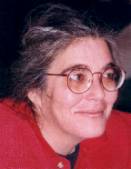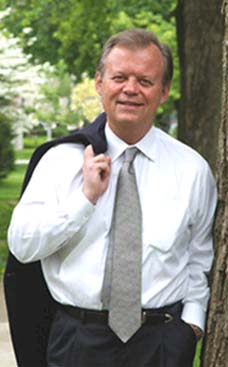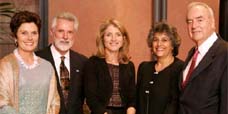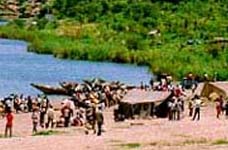
With mother Mary Garst and sisters Sarah Garst of West Des Moines, Jennifer Garst of Ames and Kate Garst of Seattle, Wash., they are donating 5,000 acres of the family land near Coon Rapids to create the private nonprofit Whiterock Conservancy. The land's estimated worth is between $6 million and $7 million.
Colombia RPCV Liz Garst helps create the nonprofit Whiterock Conservancy
Growing up Garst
Liz and Rachel Garst love the land but in a different way than their famous grandfather.
By MIKE KILEN
REGISTER STAFF WRITER
January 8, 2006
Coon Rapids, Ia. Liz Garst tells funny stories, friends say. But while we're sitting at her kitchen island, not many surface.
It's all resume material: Prep school, Stanford, Michigan State, Harvard, the Peace Corps, managing millions of dollars at the World Bank, a stint as a local bank president.
Get her out driving across the large chunks of Garst land, however, and the conversation lightens. She wears wool socks, a big sweater and a heavy coat. She chain-smokes Salems in the middle of snowy Iowa, laughing a smoker's laugh while driving down the dark gravel road pelted with large snowflakes.
Funny story: Late in her campaign for state Senate in 1995, she explains, it was rumored she was a lesbian, which would be a shocker to her longtime boyfriend.
Liz Garst, being neither a dummy nor a lesbian, but the offspring of a savvy family with a pronounced place in the state's agricultural history, approached the matter with aplomb.
"My boyfriend and I had to hold hands in public for three months," she said. "I don't hold hands."
Indeed, she shot a deer on opening weekend this year. But holding hands, a family member said, actually required practice. She still lost the race but not without a laugh and a good fight.
Growing up wealthy as one of six kids in a town as small as Coon Rapids, one must know how to do both.
"I tell you what," said Mike Deeth, who runs the Coon Bowl in town and is a family friend, "if I was in a fistfight with (the Garst sisters), I'd be scared. They will not back down."
Two of the sisters, Liz and Rachel, believe in a new way to use the land ecotourism and are giving away a chunk of their inheritance.
With mother Mary Garst and sisters Sarah Garst of West Des Moines, Jennifer Garst of Ames and Kate Garst of Seattle, Wash., they are donating 5,000 acres of the family land near Coon Rapids to create the private nonprofit Whiterock Conservancy. The land's estimated worth is between $6 million and $7 million.
The land is startlingly beautiful, situated along the rolling Middle Raccoon River Valley. Timber, pasture, restored prairies and oak savannas will one day, they hope, create a laboratory for nature conservation, a test site for how to marry agriculture and nature and become a public playground for recreationists. Conservationists call it one of the largest land gifts in Iowa history.
They hope tourist businesses bloom along the edge of the park and that the town, suffering from rural blight, bustles with visitors to bike trails and local shops.
Last October, largely due to the dogged efforts of the Garst sisters, the state named Coon Rapids one of its three Iowa Great Places, which could yield grants and state assistance.
But their effort has faced challenges, including an ongoing dust-up with an adjacent landowner, which has produced nasty name-calling. They fear the landowner wants to place a hog confinement near the land, so they have gathered petitions, erected signs and started an all-out campaign to stop it.
The sisters have taken on different roles. Liz, 54, is the numbers-cruncher, the backroom dealer and resident storyteller. She fights within the system. Rachel, 48, is the impassioned and dogged idealist. She fights the system.
It is an impressive tag team.
To understand why they love the land, one must go back to the beginning.
Liz and Rachel were born into privilege and fame in Iowa. Their grandfather, Roswell Garst, turned his Garst and Thomas Seed Corn Co. into a tidy fortune by touting hybrid seed. The company has since been sold, but Garst signs are still visible across the state.
Roswell Garst became a world player, hosting Soviet Premier Nikita Khrushchev at his farm in 1959. Liz and Rachel were there. They remember their grandmother saying their spirited grandfather was making a fool of himself by good-naturedly throwing silage at reporters that day.
There was no slacking in the Garst home. By age 8, they were working. Join a sports team or go to work, they were told. Not being athletic, they carried the local shopper to doorsteps for a penny a paper.
Later they worked the farm and they picked up lessons on stewardship and service.
"Roswell said it was our duty to form opinions on what would make the world a better place, and then do something about it," Liz said.
While Roswell was a key player in the "Green Revolution" of farming, using every inch of land for production, their father, Stephen, introduced a conservation ethic. An avid hunter and fisherman, he worked hard for decades to establish trails, and tended and paid for free fishing ponds on his land.
Their mother, Mary, Rachel said, showed them the value of being involved in the community and interested in the world.
The latter made it an easy choice to leave the little one-horse town. That and the fact that the rich kids lived in a fish bowl.
As the oldest child, Liz has led the way in pushing worldly ideas, even with manure on her boots.
So when she left Coon Rapids in the late 1960s for an all-girls prep school in Troy, N.Y., Liz quickly realized it didn't fit her personality. It was full of little rich snots, she said.
"(My daughters') lack of sophistication never bothered them," said Mary Garst. "They never went phony sophisticate. It could have been tempting."
The education Liz got there was worth it.
"I had the mind-set that the world circled around me," she said. "It was great to get away. No one knew my name. I became an anonymous person again."
Liz studied rural development at several colleges, traveled overseas and settled at the World Bank in Washington, D.C., in 1980. She returned to Iowa two years later to help manage the family finances for five years.
"I've long been the heir apparent to the Garst family business," Liz said.
Times were rocky in the farm crisis of the 1980s, and her father sold off land to pay debts, she said. The Garst daughters began buying some of the land to keep it in the family. In 1987, Liz Garst began a 10-year stint as a bank president in Adel. "I wasn't that good of a bank president," she said. "To be good at it, you had to be conservative. I'm more adventuresome than a bank president should be."
She considered opening a dried-flower shop in a West Des Moines mall. But her father had Alzheimer's disease, which pulled her back to the woods.
In 1997, she opened Garst Family Resorts on the family property. Visitors can stay in a bed-and-breakfast on the old farm, canoe the river and ride horses. She took the old barn and re-created dances first held on the property in the 1920s.
Liz is a woman who wrestles fires while orchestrating prairie burns on her land, rips out business plans with a sharpened pencil and entertains, with that signature dry laugh, the eclectic group of wayfarers who show up at her resort.
"Liz can tell stories on everything from opera to earthworm growing," said Nate Hoogeveen, a friend and Iowa's water trail coordinator. "They were encouraged from day one to think very widely."
As an adult, Liz has come to view small towns as less suffocating than intriguing.
"They come in all shapes and sizes here," Liz said. "In Washington, D.C., I only knew people just like me - yuppies who had to read the Washington Post every morning.
"I didn't know any alcoholics or crazy people or little old church ladies. In a little town you get to know them all."
Her father's death in 2004 cemented her place in the community. It was also a wake-up call.
"You realize you are next," she said.
Rachel Garst barely lets you stamp off your boots before attacking a subject heavy on her mind.
"I'm worked up," she said, wearing a hunting coat and sitting behind a pile of research papers stacked on her dining room table.
You don't want to be in a courtroom or be a deer running in the woods around her. She shot one on opening weekend, just like Liz.
Yet Rachel began by saving animals.
"Some scuzzy kid found a great horned owl nest and said he was going to kill it," explained Rachel's sister, Sarah, a veterinarian in West Des Moines. "So Rachel climbed up the tree and found two baby owls. We raised one of them. She told the kid that a raccoon got it. Only later did she find out that the mother great horned owls will attack."
Thus began her fearless pursuits.
Rachel would have none of the snobbish East Coast prep girl environment. She spirited off in high school for a more bohemian prep school in Italy.
"I sought an alternate route to my life," she said.
During her overseas travels, her mind opened to the world. Poland, England, Costa Rica. She took it all in. It was hard to have a famous last name In Iowa, she said, but 3,000 miles away it didn't matter.
On one trip home, it struck Rachel that she had a deep connection to Iowa. The flight out of Chicago was canceled, so she took a bus through the state.
"The early morning sky was black and orange, and there was a light on in a farm house in the distance," she said. "It was, like, 'Ahhhh.' "
She couldn't stay, though, and settle for a comfortable life. Rachel had seen too much poverty. She told her mother that they had so much and others had so little.
It was on a study-abroad program to Guatemala in 1979 that Rachel was hooked.
"I walked into the middle of a bloodbath," Rachel said of the dictatorship's assassinations of academics and civilians. "I felt compelled to stay there as a witness."
From 1979 to 2001, she worked as a human-rights advocate as the country endured tumultuous times in its drive to democracy.
At times, death threats were on her head. Bulletins would warn others not to stand near her.
"I thought I would die many times," Rachel said. "I would lie in bed at night and wonder if I was going to die or be tortured. But I felt like I was doing something important."
She wrote books and rallied for openness. She founded the Central America Regional Advocacy Training program through the Washington Office on Latin America (WOLA).
"Rachel was dogged in working to bring democracy to the people," said Geoff Thale, WOLA's program director. "She was a key player."
But the threats on Rachel's life were hard on her family.
After constantly looking over her shoulder for danger, and adopting three Guatemalan children, Rachel felt the pull of the Iowa land, just as her sister had.
It first came to her during a poetry course she took while on vacation.
"It was very strong," Rachel said. "I didn't see it coming. I realized I had this deep connection to Iowa."
When she came back to Iowa, she said she didn't want any crying, Sarah remembered. "So we all went to the airport in sunglasses."
Crying isn't part of the Garst legacy.
After their father died, the Garst sisters quickly got serious about what to do with the land they loved.
In 2004 they decided to donate it and form a nonprofit organization. A Whiterock board, which includes three of the Garst sisters Liz, Rachel and Jennifer and state and conservation officials, began to work on developing extensive conservation, education and recreation plans.
The land is owned by the Iowa Natural Heritage Foundation until Whiterock attains its IRS nonprofit status. For tax purposes, they are giving the land away in chunks over the next 10 years.
The hoots and catcalls started immediately from some county residents. Some thought the Garsts were doing it for a tax savings.
But Guthrie County Attorney Parry Stetzel said the donation won't affect the county tax rolls much. Only 320 acres in a land trust per county can be exempt.
"Sometimes," Liz tells Rachel, "you just have to let it roll off your shoulders."
But the hard-nosed nature of the Garst sisters surfaced with another issue when they got wind of a potentially foul development. A group with ties to hog developments bought property adjacent to Whiterock.
Although landowners have yet to file for any state permits for a hog operation, Rachel Garst has worked nearly around the clock researching the potential problem.
Swinging into an aggressive defense, they arranged meetings with Gerald Murphy of Indianola, who says he represents the landowners, Mary Noreen Murphy Family Farms and Makar Enterprises Inc. Documents filed with the Iowa Secretary of State's office show Murphy is the registered agent for Makar Enterprises, which owns a 2,400-head hog confinement in Pocahontas County.
The dispute became public. Rachel Garst led a drive to erect signs protesting hog confinements on neighbors' lands. She sought out media to tell the story of what she sees as the main issue that Iowa law supplies insufficient protection to the rural population and natural areas from hog confinements.
The Garsts say they offered to buy the land at "fair market value." Murphy rejected the offer and asked for a chunk of the Garsts' other property in a trade. Rachel says their land is more valuable.
Some wonder why the Garsts, who still own three banks and lease farmland, don't just pay him off or use their political clout to keep a potential hog confinement away.
Rachel gives this answer: "If the solution to indiscriminate citing of hog confinements is that you personally need to buy out the hog developers to protect your home, business or natural area, then only wealthy people will be able to protect themselves. What about everybody else?"
Murphy says the Garsts are trying to exact private benefits by raising public funds for the conservancy.
Neighbors are divided. Jennifer Stringer, who lives near conservancy land, says they are firmly behind the Garsts' opposition to a potential confinement and hope to start a horse-riding stable for tourists near Whiterock.
Other neighbors, such as Ivan Brewer, say the Garsts play hardball when they don't get their way.
"I tried to be a good neighbor to them," Brewer said. "But I think they wanted my place awful bad. The old boy who I bought it from his last request is the Garst family shouldn't have it."
For the most part, the two sisters chalk it up to a long-running battle with some local people who don't share their vision that nature and agriculture can coexist.
It's their family story, changing with the times in their relationship with the land.
Few would bet against them.
"Win or lose," said Sarah Garst, "they both have a passion in their heart and a fire in their belly."















